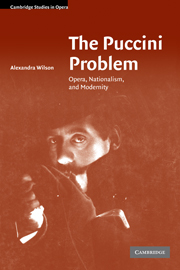Book contents
- Frontmatter
- Contents
- List of illustrations
- Acknowledgements
- Note on translations
- Introduction
- 1 Inventing an Italian composer
- 2 La bohème: organicism, progress and the press
- 3 Tosca: truth and lies
- 4 A frame without a canvas: Madama Butterfly and the superficial
- 5 Torrefranca versus Puccini
- 6 The Italian composer as internationalist
- 7 A suitable ending?
- Epilogue
- Appendix 1: selected newspapers and journals
- Appendix 2: personalia
- Notes
- Bibliography
- Index
6 - The Italian composer as internationalist
Published online by Cambridge University Press: 22 September 2009
- Frontmatter
- Contents
- List of illustrations
- Acknowledgements
- Note on translations
- Introduction
- 1 Inventing an Italian composer
- 2 La bohème: organicism, progress and the press
- 3 Tosca: truth and lies
- 4 A frame without a canvas: Madama Butterfly and the superficial
- 5 Torrefranca versus Puccini
- 6 The Italian composer as internationalist
- 7 A suitable ending?
- Epilogue
- Appendix 1: selected newspapers and journals
- Appendix 2: personalia
- Notes
- Bibliography
- Index
Summary
The 1910s were, on the whole, unhappy years for Puccini. It is hard to imagine how his reputation as national composer could have withstood the blow dealt to it by Torrefranca's book, which had denounced his music so explicitly and publicly as unoriginal, artificial, merely decorative, effeminate and diseased. Unfortunately for Puccini, the reviews of his operas of the 1910s, and particularly of La fanciulla del West and La rondine, did little to refute Torrefranca's objections, and the charges of insincerity and fragmentation in his music that critics had been pressing for near on two decades merely grew louder. Of particular concern was the issue of internationalism, which emerged prominently at this stage in Puccini's career for a number of reasons: because it had been problematised so stridently in Torrefranca's book, because received notions of Italian national identity were being vociferously challenged by the new nationalists during the 1910s and because Puccini's operas of this period were all first performed in front of foreign audiences. For many observers this last trend raised questions about Puccini's commitment to carrying on the Italian tradition, at a time when the long-standing anxieties about what constituted ‘Italian music’ were intensifying. As Francesco Balilla Pratella, a member of the Italian musical avant garde, observed in Verdi's centenary year (1913): ‘A great preoccupation for all musicians, whether old or young, is that of the question of italianità. Our musicians are no longer sure of their Italianness.’
- Type
- Chapter
- Information
- The Puccini ProblemOpera, Nationalism, and Modernity, pp. 155 - 184Publisher: Cambridge University PressPrint publication year: 2007

